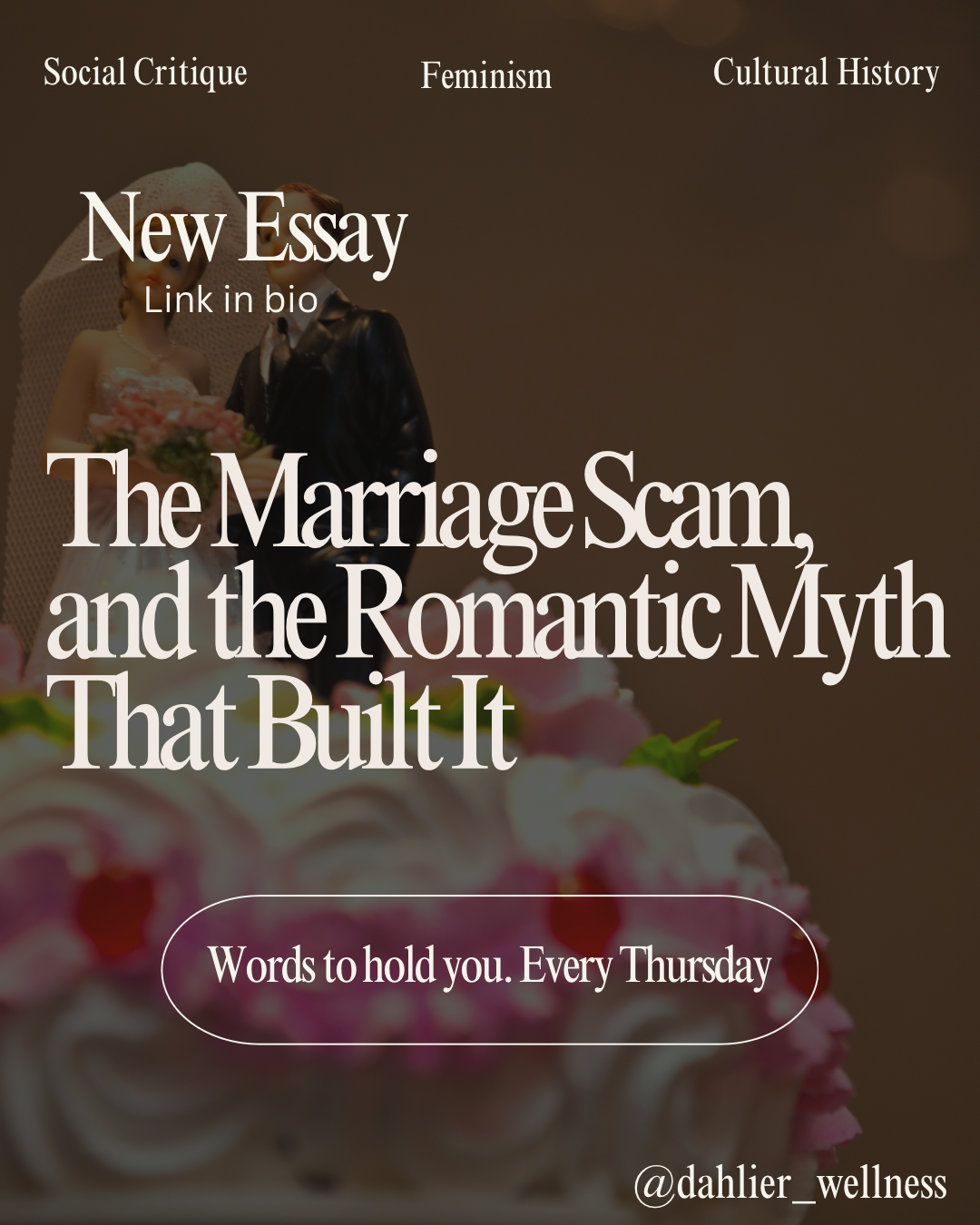The Marriage Scam, and the Romantic Myth That Built It
•Posted on August 16 2025

It was never about love. From patriarchy to class control, marriage has always been designed to serve men—and the system that protects them.
___________________________________________
Marriage has long been sold to us as a promise of security, love, and legitimacy. But strip away the layers of romance and ritual, and what emerges is something far less romantic: a system designed to uphold patriarchy, secure wealth, and regulate women’s worth. This essay asks what happens when we stop pretending marriage serves us equally—and who, in the end, it was built to serve.
_____________________________________________
Lately, I’ve been thinking about Tudor history. About how, under Henry VIII, a queen’s worth was measured almost entirely by her ability to produce an heir. If she could not, she was discarded, annulled, or killed. The throne was not about love, nor partnership, but about survival of a dynasty. And yet this logic didn’t just belong to England. Across Africa, Asia, China, and beyond, women’s bodies were bound to the same bargain: produce heirs or be cast aside, ostracized, or eliminated.
_____________________________________________
When I sit with this, I realize how little has changed. We like to believe we’ve evolved into a world where marriage is a sacred bond built on love, but that’s a recent invention — and a false one. Romance is one of patriarchy’s most successful illusions. White women were historically sold the fairytale of romance, while Black women were conditioned into “struggle love,” a script of endurance, loyalty, and sacrifice. Different costumes, same theater. Both were designed to tether women to men, ensuring their labor, their bodies, and their silence could be relied on.
_____________________________________________
Even popular culture has long worked to enforce this script. In Disney films, single women are so often cast as villains: Ursula, Maleficent, Cruella. They are punished for their sovereignty, their refusal to be tethered to a man. The subtext is clear — fail to marry and you risk becoming the monster. In our everyday language, we carry the same joke: “the old spinster,” “the cat lady with a hundred pets.” The warning is ancient and familiar: do not stray too far from men, or you will be punished with loneliness, madness, or villainy. Sovereignty from men — and the idea of refusing institutional marriage — is not only discouraged but demonized.
___________________________________________
But marriage has never been just about gender. It’s also about race and class. Poor people are brainwashed into believing marriage is stability. They marry young, they have children, and those children become more workers for the machine. Marriage among the working class is not about romance — it’s about producing labor and keeping families tethered to scarcity. Meanwhile, the wealthy are convinced to marry not out of need, but to hoard. Marriage secures assets, legacy, and bloodlines. It keeps wealth in circulation among the already wealthy, ensuring old money never “bleeds out” into lower classes. Despite the stories Hollywood loves to sell, it is exceedingly rare for wealth to trickle down through marriage. The poor marry the poor. The rich marry the rich. Marriage is not only a gendered contract — it is one of the most efficient systems of class preservation ever invented.
_____________________________________________
bell hooks once wrote about how marriage benefits men far more than women. The data is staggering: married men live longer, while married women die sooner than their unmarried counterparts. Men are less likely to leave a marriage unless their wife gets sick — and in those cases, they overwhelmingly do. A woman’s suffering often guarantees her abandonment. So if marriage benefits men with longevity, care, and stability, while costing women their health, autonomy, and sometimes their very lives — why do we still cling to it?
Because romance keeps us tethered. It is the trick. Without it, the system falls apart. And yet we’re watching that very unraveling unfold: the so-called “male loneliness epidemic.” Men are dying from their own lack of intimacy and connection, their inability to nurture, to hold, to sustain. Few men are good caregivers. Few men have developed emotional intelligence or the capacity for empathy. For centuries, they never had to — because women were forced to fill that gap. But what happens when women refuse?
_____________________________________________
This is the turning point I feel in my own body. I come from a long line of women who were taught their worth lay in marriage, in having a man, in producing children. I was brainwashed with that story, too. But I am the rebellion. My refusal to marry for survival, to settle into a lie, is not just personal — it is ancestral resistance.
The question is: what happens as more of us join that rebellion? What happens when women stop sacrificing themselves at the altar of romance and survival? Will the lonely men left behind collapse under the weight of their own neglect? Will the hoarded wealth of dynasties fracture when women refuse to play their part? Or will the natural order of things finally restore itself — a balance long denied by patriarchy, which was never natural, only imposed?
_____________________________________________
I don’t have the answer yet. But I do know this: patriarchy has always been a fragile system. It survives only because women — and the poor — are convinced to keep it alive. And maybe, just maybe, the most radical act isn’t overthrowing it by force — but starving it, refusing to play the role it demands.
Comments
0 Comments
Leave a Comment